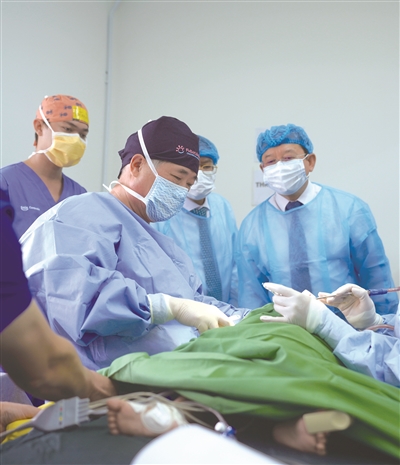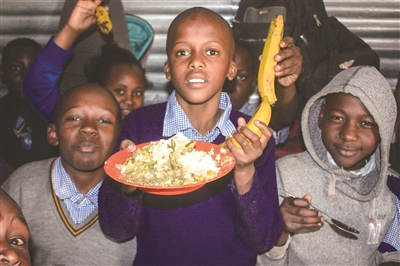
Ramunion Rescue Team on mission in Myanmar.

“Future Smile” provides surgeries in Cambodia.

CHINT donated solar PV systems and received artwork from Ugandan artists in return.

“Lunch for Children” program in Kenya.
By Jin Yingying, Chen Miaolin
Philanthropy has long played a vital role in both business development and community welfare. In recent years, companies and charitable organizations from Zhejiang have taken this spirit of giving beyond China’s borders, creating meaningful change around the world. The growing movement of “philanthropy going global” marks a new era of corporate responsibility, where Zhejiang enterprises and NGOs are addressing urgent needs in developing regions.
Ramunion leads life-saving mission
in Myanmar
Following the recent earthquake in Myanmar, the Ramunion Rescue Team from Zhejiang was swiftly deployed to quake-hit areas. On Apr 2, the first team from this Hangzhou-based civilian rescue organization returned to China after completing their mission.
From Mar 29 to Apr 2, the team operated in Mandalay’s designated disaster zones under the guidance of the United Nations UCC. During the five-day operation, they inspected 15 collapsed buildings, rescued five survivors, and helped recover the bodies of 28 victims.
Composed of 16 members from the Urban Search and Rescue (USAR) Special Operations Unit, the team concluded their mission and returned via Mandalay Airport.
“Transportation to Mandalay was extremely inconvenient and took hours, delaying rescue efforts,” said He Jun, founder and co-chair of Ramunion. “Temperatures exceeded 40°C, further challenging both our team and the survivors. Still, it was a deeply meaningful mission.”
Ramunion has established 11 domestic emergency teams in cities like Hangzhou and Beijing, along with six overseas units in countries including the United States and Italy.
Zhejiang enterprises
driving global goodwill
In the remote borderlands of Uganda, two once-dark clinics now shine with life-saving solar energy, thanks to Chinese enterprise CHINT Group. This isn’t just infrastructure--it’s hope. “We wanted to light up hospitals and tangibly help people,” said Gu Hao, CHINT’s Director of International Public Relations.
CHINT is part of a broader wave of Zhejiang-based companies practicing global philanthropy. From Africa to Southeast Asia, these businesses are embracing a model known as “Shanjingji”, or the Economy of Goodness. Projects are grounded in core industries while responding to local challenges--fostering trust and long-term growth.
Take Hailiang Group, for example: it not only operates factories in Vietnam but also cleans polluted rivers and funds education for underprivileged children. “We’re here not just to profit, but to grow with the community,” Gu Hao explained. These values have made names like CHINT and Hailiang synonymous with reliability and compassion abroad.
The strategy is simple yet far-reaching: leverage core expertise to solve real-world problems. Tansfar’s XinAn Chemical trains more than 250,000 Ghanaian farmers annually in sustainable pest control, while Holley Group transformed malaria treatment in Africa--offering artemisinin at just $1 per dose, boosting the income of over 100,000 Chinese farmers. “This was never just business; it’s a mission,” said Holley Chairman Wang Licheng.
These efforts reflect a deeper strategic shift. As global supply chains demand higher ESG (Environmental, Social, Governance) standards, Zhejiang companies are embedding sustainability into their operations. CHINT, for instance, now requires ESG compliance from over 2,000 suppliers, after a Fortune 500 client raised concerns. “ESG isn’t optional--it’s our key to global relevance,” Gu Hao emphasized.
The results are transformative. In Thailand’s Sino-Thai Rayong Industrial Zone, developed by Holley, over 230 companies employ 40,000 locals--offering a model for sustainable overseas expansion. Meanwhile, Hailiang’s scholarship program supports future leaders like Chen Xiaolong, a Laos-born student at Tsinghua University. “These initiatives build bridges, not just trade,” said He Yuwen of the Zhejiang Jiaxing Charity Foundation.
As the “Economy of Goodness” gains global traction, its message is clear: doing good is good business. For clinics in Uganda or students in Vietnam, that message is already changing lives--one solar panel, one scholarship, one dose at a time.
NGOs extending
Chinese philanthropy abroad
Chinese NGOs are also stepping onto the global stage. A notable example is the “Free Lunch for Children” program, which has raised nearly 1.2 billion yuan since 2011 to provide meals to children in thousands of rural schools across China--ultimately influencing national policy.
In 2016, the program expanded into Africa through the international “Lunch for Children” initiative. By May 2024, it had reached Kenya, Uganda, Malawi, Nigeria, Ethiopia, and Tanzania--benefiting 8,297 students, helping 1,105 children return to school, and creating jobs for over 100 African women. During the pandemic, the program delivered 1,200 food packages to families in need.
Another standout effort is from the Future Smile Charitable Foundation, which supports children with facial deformities. In March, the foundation launched a new mission at Siem Reap Provincial Hospital in Cambodia, offering free assessments and surgeries for cleft lip and palate.
In February, four representatives, including those from the foundation, were awarded the Grand Cross of the Royal Order of Monisaraphon by Cambodia’s Minister of Health for their contributions to healthcare.
Back in September 2024, the foundation and Pundarika Charity donated four ambulances and performed free surgeries for dozens of Cambodian children. The foundation’s first international mission was in 2006, and in 2015, it helped form the “Smile Asia Member Charity” network--creating a Belt and Road model for charitable outreach. To date, it has helped more than 81,000 patients regain their smiles, confidence, and a better quality of life.
As China emphasizes “new quality productive forces” and promotes the “sweet potato economy” model for global growth, Zhejiang enterprises are at the forefront--not only expanding abroad, but bringing “public welfare” and “responsibility” with them. In doing so, they are telling credible, heartwarming stories of China through shared values, sustainable partnerships, and meaningful cultural exchange.
